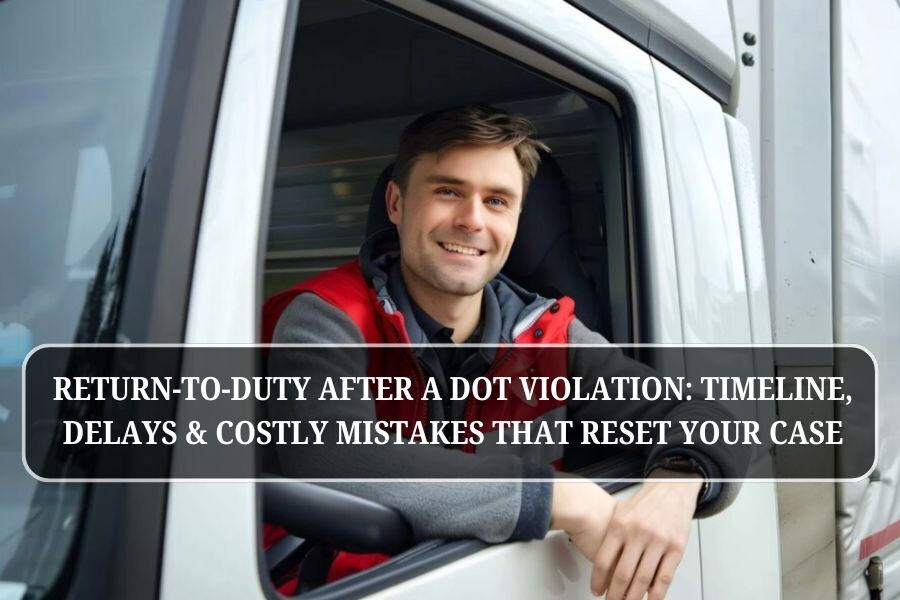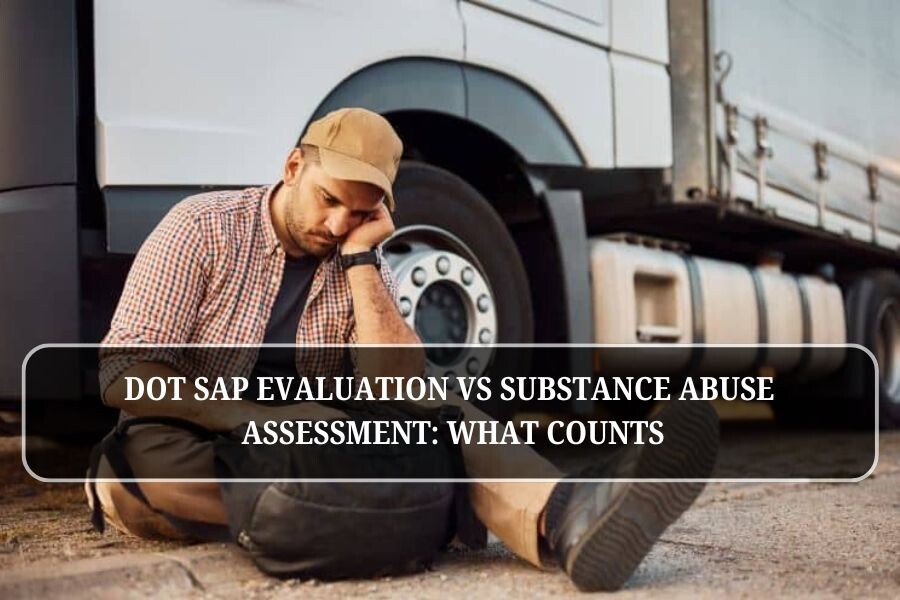If you are a DOT-regulated safety-sensitive employee who has tested positive for drugs or alcohol, or refused a DOT test, you are legally required to complete a DOT SAP Evaluation before returning to work. This process is mandated under 49 CFR Part 40 and overseen by a DOT-qualified Substance Abuse Professional (SAP).
A DOT SAP Evaluation is not optional. It is the only legal pathway back to safety-sensitive employment after a DOT drug or alcohol violation.
At AACS Counseling, we specialize in providing the fastest, most affordable, and fully DOT-compliant DOT SAP Evaluations nationwide, delivered 100% virtually with multilingual services and flexible payment options. Thousands of drivers and safety-sensitive professionals trust us every year to help them return to duty quickly and correctly.
This comprehensive guide explains everything you need to know about the DOT SAP Evaluation, how it works, what DOT requires, and why AACS Counseling is the #1 choice for speed, affordability, and compliance.
What Is a DOT SAP Evaluation?
A DOT SAP Evaluation is a federally mandated clinical assessment required after a DOT drug or alcohol violation. The evaluation must be conducted by a DOT-qualified Substance Abuse Professional (SAP) listed under DOT regulations.
The Purpose of the Evaluation Is To:
Assess the circumstances of the DOT violation
Evaluate substance use history and risk
Determine education or treatment requirements
Ensure public safety
Establish a compliance pathway back to work
Without a completed DOT SAP Evaluation, you cannot legally return to any DOT safety-sensitive position.
Who Needs a DOT SAP Evaluation?
You are required to complete a DOT SAP Evaluation if any DOT agency regulates you and you have committed a violation, including:
Positive DOT drug test
Positive DOT alcohol test (0.04 or higher)
Refusal to test
Adulterated or substituted test
Failure to remain available for testing
DOT Agencies Covered Include:
FMCSA (CDL drivers, truck drivers)
FAA (pilots, aviation professionals)
FRA (railroad employees)
FTA (transit operators)
USCG (maritime employees)
PHMSA (pipeline workers)
DOT SAP Evaluation vs. Regular Substance Abuse Evaluation
A DOT SAP Evaluation is not the same as a general substance abuse assessment.
Federally mandated vs. often voluntary or court-ordered
Must follow 49 CFR Part 40 vs. not DOT-regulated
Conducted only by DOT-qualified SAPs vs. any licensed clinician
Required for return-to-duty vs. not sufficient for DOT compliance
Only a DOT-qualified SAP can conduct a valid DOT SAP Evaluation.
Why the DOT SAP Evaluation Is Critical
Failing to complete a DOT SAP Evaluation can result in:
Long-term unemployment
Inability to return to safety-sensitive work
FMCSA Clearinghouse blocks
Loss of income and career disruption
Completing the evaluation quickly and correctly is essential. This is why choosing an experienced SAP provider matters.
Step-by-Step: How the DOT SAP Evaluation Process Works
Step 1: Schedule Your DOT SAP Evaluation
At AACS Counseling, you can schedule your DOT SAP Evaluation the same day or the next day, completely online.
✔ No waiting lists
✔ Nationwide availability
✔ Secure telehealth platform
Step 2: Initial DOT SAP Evaluation
The initial evaluation includes:
Review of DOT violation
Substance use history
Risk and safety assessment
Behavioral patterns
Readiness for compliance
The SAP determines what education or treatment is required under DOT regulations.
Step 3: SAP-Mandated Education or Treatment
Based on DOT guidelines, the SAP may require:
DOT education program
Substance abuse counseling
Outpatient treatment
Combination of services
Important:
DOT SAPs do not automatically require rehab. Requirements are individualized and clinically justified.
Step 4: Follow-Up DOT SAP Evaluation
Once requirements are completed, you must attend a follow-up SAP evaluation to verify compliance.
Only after this step can the SAP authorize a return-to-duty test.
Step 5: DOT Return-to-Duty Test
Your employer arranges a directly observed DOT drug and/or alcohol test. A negative result allows you to return to work.
Step 6: Follow-Up Testing Plan
DOT regulations require a follow-up testing plan:
Unannounced tests
Up to 60 months
Separate from employer random testing
Virtual DOT SAP Evaluations: Fastest Option Nationwide
AACS Counseling provides 100% virtual DOT SAP Evaluations, making us one of the fastest providers in the United States.
Benefits of Virtual DOT SAP Evaluations
Immediate scheduling
No travel required
Confidential & HIPAA-compliant
Nationwide service
Faster documentation
Virtual evaluations are fully accepted under DOT regulations when conducted by a qualified SAP.

Why AACS Counseling Is the Fastest DOT SAP Evaluation Provider
We are trusted nationwide because we offer:
✔ Same-day appointments
✔ Rapid SAP documentation
✔ Clear DOT-compliant reports
✔ No unnecessary delays
✔ Experienced DOT SAP clinicians
Many clients begin the process within 24 hours.
The Cheapest DOT SAP Evaluation, Without Cutting Corners
AACS Counseling is committed to affordability while maintaining full DOT compliance.
Affordable Options Include:
Transparent pricing
No hidden fees
Afterpay (Pay-in-4)
In-house financing
Completing your DOT SAP Evaluation should not create financial hardship.
Multilingual DOT SAP Evaluation Services
We proudly offer DOT SAP Evaluations in multiple languages to ensure understanding and compliance.
Languages Available:
English
Spanish
Arabic
Armenian
French
Hindi
Tagalog
Togolese (Ewe/Mina)
Language barriers should never delay your return to work.
DOT SAP Evaluations for All Safety-Sensitive Professionals
We serve:
CDL drivers
Owner-operators
Trucking company employees
Pilots
Railroad workers
Transit operators
Maritime professionals
Pipeline workers
Whether employer-referred or self-referred, we can help.
Common Myths About DOT SAP Evaluations
Myth: I can switch employers to avoid SAP
❌ False. DOT violations follow you in the Clearinghouse.
Myth: Any counselor can perform a SAP evaluation
❌ False. Only DOT-qualified SAPs are authorized.
Myth: Rehab is always required
❌ False. SAP recommendations are individualized.
How Long Does a DOT SAP Evaluation Take?
Initial evaluation: 45–60 minutes
Follow-up evaluation: 30–45 minutes
Total timeline: Often weeks, not months, with AACS Counseling
Is a DOT SAP Evaluation Confidential?
Yes. All services are:
HIPAA-compliant
DOT-compliant
Shared only with authorized parties
Why Employers Trust AACS Counseling
Employers rely on us because we provide:
Accurate SAP documentation
Fast compliance verification
Professional oversight
Clear communication
Start Your DOT SAP Evaluation Today
If you have had a DOT violation, time matters.
👉 Schedule your DOT SAP Evaluation now
👉 Call: 800-683-7745
👉 Visit: https://www.aacscounseling.com/sap-evaluations/
Fast • Affordable • DOT-Compliant • Nationwide











